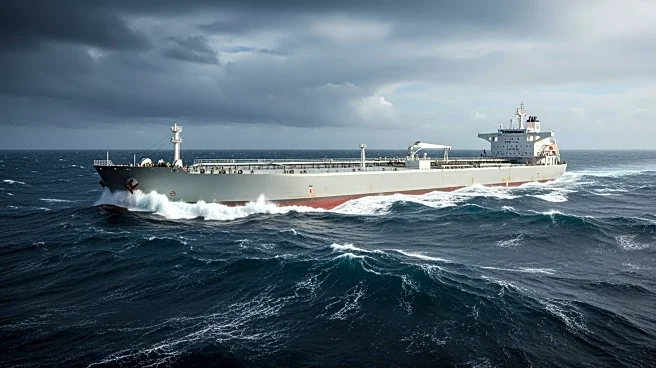What's Happening?
Iranian tankers have resumed their practice of evading sanctions by turning off their AIS location systems, a move detected by the Maritime Intelligence company Windward. This comes after a brief period in mid-October when most Iranian-owned tankers turned
on their AIS systems, following the re-imposition of UN sanctions on September 28. The Iranian fleet, primarily belonging to the National Iranian Tanker Company (NITC), had been broadcasting their locations, but by October 16, only nine tankers were still transmitting AIS signals. The UN Security Council's decision to reinstate sanctions was not vetoed by Russia and China, although both countries have since stated they will not recognize the UN's mandate in this matter.
Why It's Important?
The resumption of sanctions-evading behavior by Iranian tankers highlights the ongoing geopolitical tensions and the challenges in enforcing international sanctions. Iran's actions, supported by Russia and China, reflect a broader strategy to undermine the Western-dominated international relations framework. This situation complicates the enforcement of sanctions, particularly for countries like the United States that are pushing for stricter compliance. The visibility of Iranian tankers is crucial for their oil exports to China, which accounts for 90% of Iran's oil exports. However, the reluctance of Chinese firms to be associated with sanctioned Iranian oil poses additional challenges for Iran's oil trade.
What's Next?
The Iranian tankers' return to sanctions-evasion tactics may lead to increased scrutiny and pressure from Western countries, particularly the United States. The geopolitical dynamics involving Russia and China could further complicate the situation, potentially leading to diplomatic confrontations or negotiations. The ongoing sanctions pressure may force Iran to find alternative methods to continue its oil exports, while countries involved in the trade may face increased risks of sanctions themselves.
Beyond the Headlines
The situation underscores the complexities of international sanctions enforcement and the role of major powers like Russia and China in shaping global trade dynamics. The Iranian tankers' actions may also influence other countries' approaches to sanctions compliance, potentially leading to shifts in international alliances and trade practices.
















